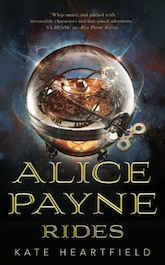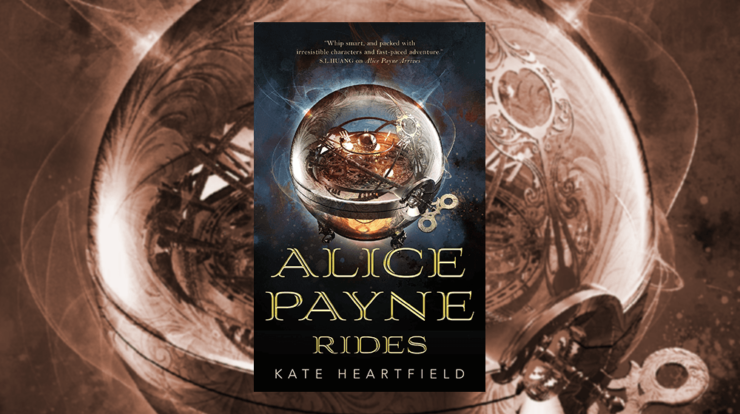I’m coming to the conclusion that Kate Heartfield may be the author whose work proves the exception to my “time travel stories never satisfy me” rule. Time travel is messy, and in a story where time travel is the focus, a classic linear narrative never quite works out. But in Heartfield’s Alice Payne novellas—first in last year’s Alice Payne Arrives, and now in its sequel, Alice Payne Rides—the mess is part of the point. The false starts, the paradoxes, the putative dead ends: these are part of the time war that the characters are either fighting or have got themselves caught up in.
Alice Payne, 18th century woman of colour, sometime highwaywoman, and lover of the scientist Jane Hodgson, is at the centre of Alice Payne Rides: her presence is the motivating force the way that Prudence Zuniga proved to be in Alice Payne Arrives. Alice, Jane, and Prudence are joined in their quest to make small, necessary alterations to the timeline by parish constable Captain Wray Auden—who’s vowed to bring the Holy Ghost, Alice’s highwayman alter ego, to justice. His ignorance of Alice’s second life brings a certain constraint to their friendship, but not one that prevents their working together.
After snatching Arthur of Brittany from his own time (and a prison cell) in 1203, Alice and her companions discover they’ve brought a smallpox-ridden young man back with them to the 1780s. (They didn’t exactly mean to. But things didn’t go very much to plan.) And Jane has never had the virus, or the cowpox that could protect her from smallpox’s potentially deadly effects. Prudence makes the decision to go to the future to get a smallpox vaccine and treatment. But once there, she finds that her former superior officer, the officer from whose forces she defected in order to be more effective at building a better timeline, has caused her sister to be erased from the timeline. Prudence is offered a choice: her sister, or her freedom to work for a better world.
Buy the Book


Alice Payne Rides
Meanwhile, Alice has—recklessly—decided to try to solve a mystery in her father’s past, in the American Revolutionary war. Her actions may be leading directly into a trap. Will she and her companions be able to preserve Prudence’s sister, their own freedom of action, and their own consciences? The question is whether they’ll make the right choices—and what constitutes the right choice.
Alice Payne Rides is, like its predecessor, a story closely focused on its characters, and on how their particular situations and attachments affect their approach to the world. Heartfield has a gifted touch for showing us compelling, believable individuals, all of whom feel real and vivid. It’s a story about family, for better or worse: the family you find, the family you build, and the family you choose. (This theme is highlighted by the presence of Alice’s father, who might have been a half-decent man once, but is now old, weak, and cruel.) It’s also a story about compassion, and how if one gets so caught up in the “bigger picture” that one can no longer care about individual lives, maybe that bigger picture isn’t all that worth fighting for.
This is an entertaining novella with a compelling voice. I really enjoyed Alice Payne Rides, and I hope Heartfield writes more in this setting.
Alice Payne Rides is available from Tor.com Publishing
Liz Bourke is a cranky queer person who reads books. She holds a Ph.D in Classics from Trinity College, Dublin. Her first book, Sleeping With Monsters, a collection of reviews and criticism, was published in 2017 by Aqueduct Press. It was a finalist for the 2018 Locus Awards and was nominated for a 2018 Hugo Award in Best Related Work. Find her at her blog, where she’s been known to talk about even more books thanks to her Patreon supporters. Or find her at her Twitter. She supports the work of the Irish Refugee Council, the Transgender Equality Network Ireland, and the Abortion Rights Campaign.










